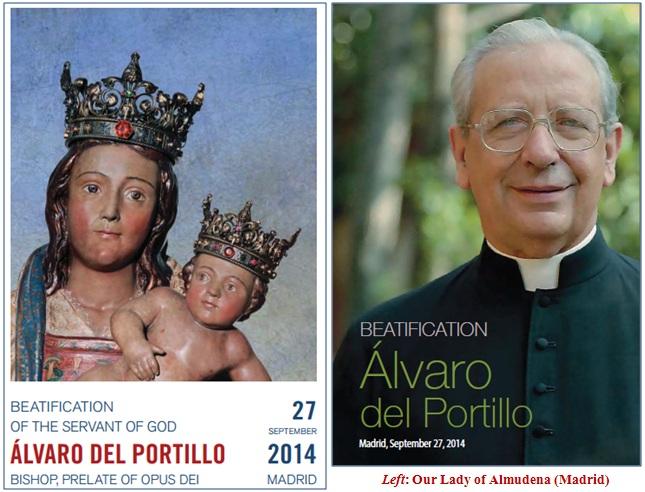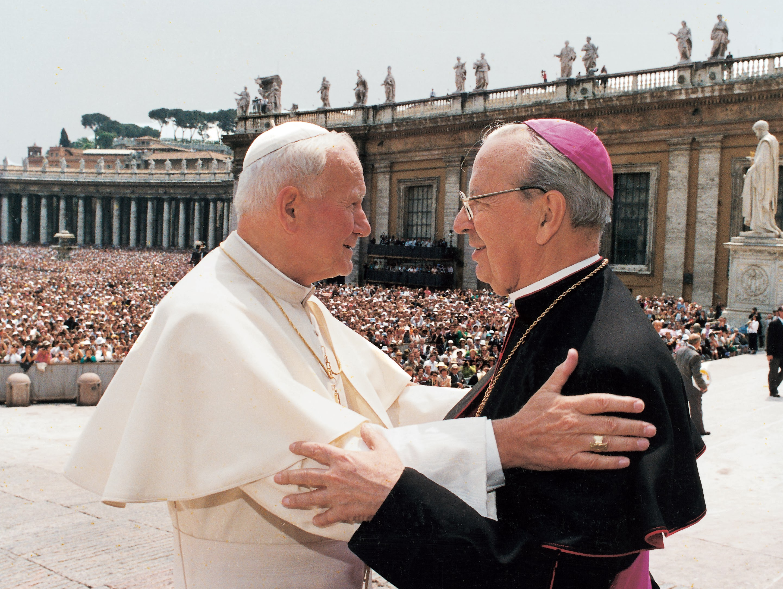MADRID, Spain — On Saturday, Bishop Álvaro del Portillo, successor to the founder of Opus Dei, St. Josemaría Escrivá de Balaguer, was beatified before tens of thousands of people from over ninety countries, including 24 international dignitaries, among whom were the Queen of Nigeria, Regina Akuchinyere Onu, and the President of Panama, Juan Carlos Varela. The mass and ceremony were presided over by his Holiness Pope Francis’s delegate, His Eminence Cardinal Angelo Amato, Prefect of the Congregation for the Causes of Saints. He was joined by 127 cardinals and bishops from around the world, including the current prelate of Opus Dei, Bishop Javier Echeverría.
“Blessed Álvaro loved and served the Church with a heart devoid of any worldly interest,” said Pope Francis in a message read by the Vicar General of Opus Dei, Fernando Ocáriz, as the ceremony got underway. “He teaches us that simplicity and ordinary life are a sure path to holiness,” said the Pope in his letter.

Don Iñaki “Ignacio” Ceyala, collaborator of Blessed Álvaro in the Curia of Opus Dei in Rome over many years, echoed this sentiment, telling me that while Opus Dei is “very happy with the beatification… the prelate accepts this moment especially for the glory of God… It’s all for the Church, for the service of souls.”
Like Pope Francis, Blessed Álvaro had a special place in his heart for souls struggling with poverty. He worked tirelessly to found educational and mentoring institutions globally that would alleviate poverty—several of which were highlightedin Madrid on Thursday, September 25.
Portillo’searlier work as a high school student with the Society of Vincent De Paul prepared his own soul to accept St. Josemaría’s invitation to join Opus Dei within a day of meeting him, according to John Coverdale, author of “Saxum: The Life of Álvaro Portillo.”Blessed Álvaro was one time badly beaten up when teaching catechism to the poor children of a Madrid barrio—yet, he continued reaching out. (Fittingly, his beatification occurred on the Feast of St. Vincent de Paul.)
This, and so much more, is why Portillo was beatified today by the Vatican.
It was a dramatic ceremony. After the Pope’s remarks were read during mass and Cardinal Amato gave the sermon, focusing on Portillo’s humility—in Escrivá’s words, “the key that opens the door to enter into the house of holiness”—the beatification ceremony began with Amato reading Portillo’s short biography and a declaration of his heroic virtues. Bishop Echeverría followed by "’humbly requesting’ the Pope to inscribe the Venerable Servant of God Bishop Álvaro del Portillo among the number of the Blessed.” Cardinal Amato then enunciated the formula for beatification, proclaiming him “Blessed.”
With that, the cloth covering the massive image of the man of the hour dramatically fell, revealing Blessed Álvaro del Portillo.
This all took place under blue, sunny skies, on a warm early autumn day, in Madrid’s Parque de Valdebebas, with the backdrop of Our Lady of Almudena, Almudena Cathedral, with the words “Regnare Christum Volumus,” (“We Want Christ to Reign”) inscribed in big black script. Lovely orchestral and choral strains accompanied the event throughout. As Holy Communion was given to the faithful, “Nearer my God, to Thee” (famously played by the string quartet on the sinking Titanic) wafted through the air. At the end of the ceremony Bishop Echeverría and Madrid’s Cardinal Antonio María Rouco Varela gave the concluding remarks. The entire ceremony reflected the "spirit of Opus Dei"—to do everything with human perfection for love of God.
Msgr. Thomas Bohlin, the U.S. Vicar of the Opus Dei Prelature, told me that with today’s beatification, as well as the canonization of the founder in 2002—and considering the speed with which they both occurred—“the church is sending a signal that they just don’t belong to Opus Dei now, but… to the whole church, as a kind of an example” for “everyone who wants to follow their path. It makes their message much more visible.” But, he said, it was the Holy Spirit that filled them “with special graces to live a holy life.”
At the root of it all is love of God. As Cardinal Donald Wuerl, Archbishop of Washington, DC, had said earlier this month, Blessed Álvaro “was a man of great spirituality. He was also just a kind and caring person. But, what came through was his concern for others was motivated by his love of God.”
Msgr. Cormac Burke, a priest of the prelature of Opus Dei, revealed to me that no one spoke against Blessed Álvaro during the beatification process, which is not the norm.
The world is a richer place for Blessed Álvaro’s humility, kindness and love, which, as of today, will be much more broadly known, to the benefit of all.
Mary Claire Kendallis a Washington-based writer. Her book, “Oasis: Conversion Stories of Hollywood Legends,” is being published in April 2015.

